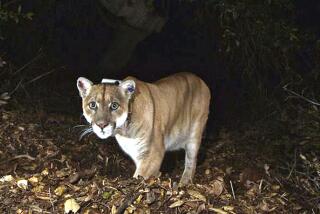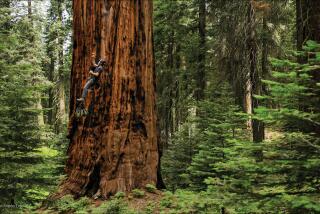Save the Magic
“The precious legacy of preservation of beauty will be our gift to posterity,” declared President Lyndon B. Johnson as he signed the Wilderness Act into law 35 years ago this weekend. No doubt some of Johnson’s effusive rhetoric was inspired by his wife, Lady Bird, a tireless advocate for safeguarding America’s natural treasures.
Over the generations there have been others who developed and nurtured the wilderness ethic--John Muir, Theodore Roosevelt, Aldo Leopold, Bob Marshall and David Brower among them. The land was always there, but it took people with vision to understand how easily and irrevocably it could be lost to exploitation and development.
The Wilderness Act has been eminently successful in preserving places where “the Earth and its community of life are untrammeled by man, where man is a visitor.” Congress has expanded the original 9 million acres to a system that covers 104 million acres in 633 separate areas. California has 14 million acres, including large preserves in the Mojave Desert, the last major additions by Congress, made in 1994.
Preserving our natural heritage was not achieved without a struggle, and the battle continues today. Many of the “saved” wild lands are threatened by development and need further protection. Millions of acres of roadless areas identified by federal agencies in the 1970s as worthy of wilderness designation remain vulnerable to misuse and degradation.
Newly energized grass-roots movements are mounting a new round of wilderness initiatives in Utah, Nevada, Arizona, New Mexico, Idaho. California advocates want protection for the Mojave National Preserve, the Klamath Basin, the Sierra’s old-growth forests, the White Mountains on the east side of Owens Valley and the King Range on the north’s Lost Coast. These last of the best wild tracts deserve protection for future generations.
The Clinton administration is supportive. But congressional leaders, ignoring overwhelming public approval of the wilderness program, are hostile. The resource exploiters who contribute heavily to election campaigns, particularly in the West, will oppose new wilderness as long as they sense there are profits to be made off the public lands. That is a 19th century Wild West mentality.
The 21st century ethic is that we go to these wild lands for recreation, solitude, physical challenge, beauty and inspiration. The wilderness, left unchanged except by natural forces, will be there to offer the same magic to generation after generation of Americans.
More to Read
Sign up for The Wild
We’ll help you find the best places to hike, bike and run, as well as the perfect silent spots for meditation and yoga.
You may occasionally receive promotional content from the Los Angeles Times.






